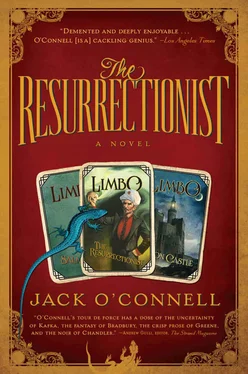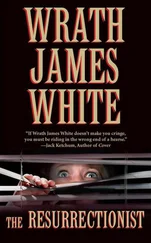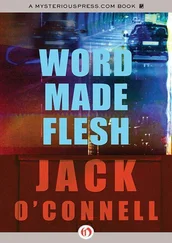Jack O'Connell - The Resurrectionist
Здесь есть возможность читать онлайн «Jack O'Connell - The Resurrectionist» весь текст электронной книги совершенно бесплатно (целиком полную версию без сокращений). В некоторых случаях можно слушать аудио, скачать через торрент в формате fb2 и присутствует краткое содержание. Год выпуска: 2009, Издательство: Algonquin Books, Жанр: Современная проза, на английском языке. Описание произведения, (предисловие) а так же отзывы посетителей доступны на портале библиотеки ЛибКат.
- Название:The Resurrectionist
- Автор:
- Издательство:Algonquin Books
- Жанр:
- Год:2009
- ISBN:нет данных
- Рейтинг книги:4 / 5. Голосов: 1
-
Избранное:Добавить в избранное
- Отзывы:
-
Ваша оценка:
- 80
- 1
- 2
- 3
- 4
- 5
The Resurrectionist: краткое содержание, описание и аннотация
Предлагаем к чтению аннотацию, описание, краткое содержание или предисловие (зависит от того, что написал сам автор книги «The Resurrectionist»). Если вы не нашли необходимую информацию о книге — напишите в комментариях, мы постараемся отыскать её.
those who create them and those who consume them. About the nature of consciousness and the power of the unknown. And, ultimately, about forgiveness and the depth of our need to extend it and receive it.
The Resurrectionist — читать онлайн бесплатно полную книгу (весь текст) целиком
Ниже представлен текст книги, разбитый по страницам. Система сохранения места последней прочитанной страницы, позволяет с удобством читать онлайн бесплатно книгу «The Resurrectionist», без необходимости каждый раз заново искать на чём Вы остановились. Поставьте закладку, и сможете в любой момент перейти на страницу, на которой закончили чтение.
Интервал:
Закладка:
Instead, Jeta and Antoinette wept and the others tried, with varying degrees of success, to assume a stoic posture. Without any delay, the gargoyles brought the freaks, in groups of two or three, to their respective coffins. No one fought and no one tried to flee. As if they’d all come, at the same instant, to some unspoken understanding or exhaustion. As if all of their spirits were like a circuit of circus lights and each one had gone out in the line.
The box for Durga was, of course, enormous. As was the one for Marcel and Vasco. Chick found himself wondering how the homunculi would manage to lower the crates into the ground. Then, ashamed at the thought, he found himself enraged. But when he spotted Kitty’s tiny coffin, his emotions simply imploded. He collapsed against the mad Dr. Fliess in a convulsion of self-loathing and despair, crushed under the realization that he had delivered the people he loved most deeply, most truly, into oblivion. Into the hopeless and ceaseless Limbo.
With one hand, Fliess stroked the chicken boy’s feathered cheek. With the other, the doctor adjusted the blade of his scalpel against Chick’s neck and made the boy lift his head.
“I want you,” the doctor said, “to witness this.”
And so, Chick watched through tear-splintered eyes as Bruno, the strongest man in the world, climbed, of his own free will, into his casket, and lay down, without a word of objection. One by one, the other freaks followed his lead.
The freaks had fought or run all the way across Gehenna. And now, here they were, models of acceptance and docility. More than anything else, in that moment, Chick wanted one final seizure, one last chance to fade out and quake and ask the reason for this gentle capitulation.
But the seizure would not come. There was no bile in his throat. No chill telegraphing up his spine. And so he tore his eyes off his clan as they lay down one by one. And turned his head upward to Dr. Fliess and asked, “Why?”
The doctor looked down at the chicken boy hesitantly, with a gaze that even a pinhead would call loving.
“Because,” said the doctor, “I am a man of both science and compassion.”
25
It was like cream at first. White on white and thick. And there was a richness, a hard sweetness. And cold moving toward freezing. That was where Sweeney first felt himself in the new moment. The sensation of his testicles rising with the cold, withdrawing — that’s what made it real, that sense of his body, that awareness. That’s what made it something more than a dream. Gave it a solidity that made it true.
He was still inside the factory. And Buzz and the Abominations were spread out around him, still in dream. That was his first sound, their collective respiration. He opened his eyes and blinked, surveyed the room and saw that Nadia was gone. He looked down to see that his pants had been pulled up and rebelted. There was a piercing sensation, like a bee sting, in the small of his back near the base of his spine. He rubbed it and only aggravated the pain.
He got to his knees and then, with some effort, to his feet. He made his way out of the cafeteria, through the kitchen, and out the loading bay onto the concrete apron. In the moonlight, he could make out the ruins behind the Harmony but everything was out of focus. He took his hand from his back, pinched the bridge of his nose and rubbed down into the circles beneath his eyes. When he looked again, his vision had cleared. In fact, everything now appeared hyperfocused, more real than real. And somewhere out among the debris of the back lot, he began to hear a noise.
At first it was difficult to locate the source. The sound echoed and distorted on its way across the yards of brick and stone. Without thinking, Sweeney jumped down off the loading dock and began to walk toward the abandoned hearse, where the Abominations had played King of the Hill. Halfway to the hearse, he understood that the noise was a human voice, a child’s cry of grief and fear. And then Sweeney was running.
When he got to the hearse, he ran from door to door, pulling at each handle. But they were all locked. He began to circle the vehicle, pounding on the smoked glass of the windows. And the more he pounded, the louder the crying grew. The sound was making him frantic. He drummed his fists against the windows but nothing happened. He jumped up onto the hood and began to kick away at the windshield with his heels, but he could not shatter the glass.
Sweeney began to sweat and his breathing became labored. But at last, near the point of exhaustion, he moved around the rear of the hearse, got on his knees, and reached down for a brick. Bringing it up above his head, he let gravity carry the red block down against the hearse’s rear window, which cracked neatly down its center. Sweeney stood and dropped the brick, used his elbow to shatter the window, reached inside the hearse, and unlatched and swung open the gate.
Bending at the waist, he peered inside. And saw that the crying child was his son. And that his son’s body was covered in feathers. In all other respects, the boy looked normal, healthy. He was simply shrouded in a layer of down.
At the sight of his father, Danny stopped crying and yelled, “Daddy.”
Sweeney inserted his arms and extracted Danny from the hearse. Then the father fell back on his heels and cradled the child against his chest. And both of them breathed and shivered and held onto each other.
“I didn’t know where you were,” Danny said, starting to cry again. “I didn’t know where you went.”
“It’s okay, Danny,” Sweeney said, hugging his son more tightly, cupping the boy’s head and easing it down to the shoulder. “I’m right here. Everything’s okay.”
“I couldn’t find Mom,” Danny said, his need to suck air fighting his need to speak.
“We’ll find Mom. It’s okay, Danny. It’s all right.”
“I got so cold, Daddy.”
“I’ll keep you warm,” Sweeney said. “I’m here now.”
“Can we go find Mom,” Danny asked, “and then go home?”
“That’s a good idea,” Sweeney said, shifting the boy in his arms and struggling up to his feet. And when he looked around, he realized that the landscape had changed.
The ruins of the old factories now stretched as far as he could see. There were no bordering streets. No tenements or mills or city lights visible in the distance. Beneath his feet, what had been brick and rock and rubble was now something else — something like baked clay, hardpan, a gray and white expanse shot through with cracks. It was flat and it extended to the horizon. There was something intensely primordial about the landscape and it triggered sudden terror in Sweeney.
Sensing his father’s panic, Danny said, “It’ll be okay, Dad.”
Sweeney wanted to ask Where are we? but was afraid of the answer. Instead, he said, “I don’t know which way to go.”
“Can I ride on your back?” Danny asked.
Sweeney hoisted him and, once secure, Danny extended his downy arm and pointed away from the Harmony factory. And they began to walk.
They covered what must have been miles, but Sweeney’s feet and back carried his burden without complaint, though his eyes watered from the oppressiveness of the air. There was a chemical smell that got worse as they progressed, something like sulfur and cabbage. Danny either didn’t notice it or didn’t mind it.
They didn’t talk much. Once Danny asked if Mom would be mad that they were late and Sweeney said, “How do you know we’ll be late?”
“We’re already late,” Danny said.
After that they came to the first Joshua tree. It was growing up out of one of the larger cracks in the hardpan. Neither father nor son commented on it and soon they were spotting more of them and the new trees were bigger, fuller, their spearlike branches all pointing in the direction Sweeney was heading.
Читать дальшеИнтервал:
Закладка:
Похожие книги на «The Resurrectionist»
Представляем Вашему вниманию похожие книги на «The Resurrectionist» списком для выбора. Мы отобрали схожую по названию и смыслу литературу в надежде предоставить читателям больше вариантов отыскать новые, интересные, ещё непрочитанные произведения.
Обсуждение, отзывы о книге «The Resurrectionist» и просто собственные мнения читателей. Оставьте ваши комментарии, напишите, что Вы думаете о произведении, его смысле или главных героях. Укажите что конкретно понравилось, а что нет, и почему Вы так считаете.












